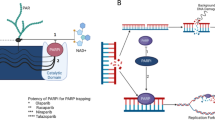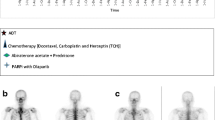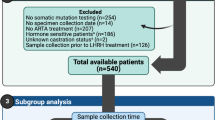Abstract
Purpose
The synergy of combining androgen receptor-signaling inhibition (ARSI) to radiotherapy (RT) in prostate cancer has been largely attributed to non-homologous end joining (NHEJ) inhibition. However, this mechanism is unlikely to explain recently observed trial results that demonstrated the sequencing of ARSI and RT significantly impacts clinical outcomes, with adjuvant ARSI following RT yielding superior outcomes to neoadjuvant/concurrent therapy. We hypothesized this is driven by differential effects on AR-signaling and alternative DNA repair pathway engagement based on ARSI/RT sequencing.
Methods
We explored the effects of ARSI sequencing with RT (neoadjuvant vs concurrent vs adjuvant) in multiple prostate cancer cell lines using androgen-deprived media and validation with the anti-androgen enzalutamide. The effects of ARSI sequencing were measured with clonogenic assays, AR-target gene transcription and translation quantification, cell cycle analysis, DNA damage and repair assays, and xenograft animal validation studies.
Results
Adjuvant ARSI after RT was significantly more effective at killing colony forming cells and decreasing the transcription and translation of downstream AR-target genes across all prostate cancer models evaluated. These results were reproduced in xenograft studies. The differential effects of ARSI sequencing were not fully explained by NHEJ inhibition alone, but by the additional disruption of homologous recombination specifically with adjuvant sequencing of ARSI.
Conclusion
We demonstrate that altered sequencing of ARSI and RT mediates differential anti-AR-signaling and anti-cancer effects, with the greatest benefit from adjuvant ARSI following RT. These results, combined with our prior clinical findings, support the superiority of an adjuvant-based sequencing approach when using ARSI with RT.





Similar content being viewed by others
Data availability
All relevant data and protocols are included in the Supplementary Information.
References
Kishan AU, Sun Y, Hartman H, Pisansky TM, Bolla M, Neven A, Steigler A, Denham JW, Feng FY, Zapatero A, Armstrong JG, Nabid A, Carrier N, Souhami L, Dunne MT, Efstathiou JA, Sandler HM, Guerrero A, Joseph D, Maingon P, de Reijke TM, Maldonado X, Ma TM, Romero T, Wang X, Rettig MB, Reiter RE, Zaorsky NG, Steinberg ML, Nickols NG, Jia AY, Garcia JA, Spratt DE (2022) Androgen deprivation therapy use and duration with definitive radiotherapy for localised prostate cancer: an individual patient data meta-analysis. Lancet Oncol 23:304–316. https://doi.org/10.1016/S1470-2045(21)00705-1
Pilepich MV, Winter K, John MJ, Mesic JB, Sause W, Rubin P, Lawton C, Machtay M, Grignon D (2001) Phase III radiation therapy oncology group (RTOG) trial 86–10 of androgen deprivation adjuvant to definitive radiotherapy in locally advanced carcinoma of the prostate. Int J Radiat Oncol Biol Phys 50:1243–1252. https://doi.org/10.1016/S0360-3016(01)01579-6
Hanks GE, Pajak TF, Porter A, Grignon D, Brereton H, Venkatesan V, Horwitz EM, Lawton C, Rosenthal SA, Sandler HM, Shipley WU (2003) Phase III trial of long-term adjuvant androgen deprivation after neoadjuvant hormonal cytoreduction and radiotherapy in locally advanced carcinoma of the prostate: the Radiation Therapy Oncology Group Protocol 92–02. J Clin Oncol 21:3972–3978. https://doi.org/10.1200/JCO.2003.11.023
Bolla M, de Reijke TM, Van Tienhoven G, Van den Bergh ACM, Oddens J, Poortmans PMP, Gez E, Kil P, Akdas A, Soete G, Kariakine O, van der Steen-Banasik EM, Musat E, Piérart M, Mauer ME, Collette L (2009) Duration of androgen suppression in the treatment of prostate cancer. N Engl J Med 360:2516–2527. https://doi.org/10.1056/nejmoa0810095
Bolla M, Van Tienhoven G, Warde P, Dubois JB, Mirimanoff RO, Storme G, Bernier J, Kuten A, Sternberg C, Billiet I, Torecilla JL, Pfeffer R, Cutajar CL, Van der Kwast T, Collette L (2010) External irradiation with or without long-term androgen suppression for prostate cancer with high metastatic risk: 10-year results of an EORTC randomised study. Lancet Oncol 11:1066–1073. https://doi.org/10.1016/S1470-2045(10)70223-0
D’Amico AV, Chen MH, Renshaw AA, Loffredo M, Kantoff PW (2008) Androgen suppression and radiation vs radiation alone for prostate cancer: a randomized trial. JAMA J Am Med Assoc 299:289–295. https://doi.org/10.1001/jama.299.3.289
Roach M, DeSilvio M, Lawton C, Uhl V, Machtay M, Seider MJ, Rotman M, Jones C, Asbell SO, Valicenti RK, Han S, Thomas CR, Shipley WS (2003) Phase III trial comparing whole-pelvic versus prostate-only radiotherapy and neoadjuvant versus adjuvant combined androgen suppression: Radiation Therapy Oncology Group 9413. J Clin Oncol 21:1904–1911. https://doi.org/10.1200/JCO.2003.05.004
Roach M, Moughan J, Lawton CAF, Dicker AP, Zeitzer KL, Gore EM, Kwok Y, Seider MJ, Hsu IC, Hartford AC, Horwitz EM, Yamoah K, Jones CU, Michalski JM, Lee WR, Pisansky TM, Rabinovitch R, Rotman M, Pryzant RM, Kim HE, Thomas CR, Shipley WU, Sandler HM (2018) Sequence of hormonal therapy and radiotherapy field size in unfavourable, localised prostate cancer (NRG/RTOG 9413): long-term results of a randomised, phase 3 trial. Lancet Oncol 19:1504–1515. https://doi.org/10.1016/S1470-2045(18)30528-X
Jones CU, Hunt D, McGowan DG, Amin MB, Chetner MP, Bruner DW, Leibenhaut MH, Husain SM, Rotman M, Souhami L, Sandler HM, Shipley WU (2011) Radiotherapy and short-term androgen deprivation for localized prostate cancer. N Engl J Med 365:107–118. https://doi.org/10.1056/NEJMoa1608029
Denham JW, Steigler A, Lamb DS, Joseph D, Turner S, Matthews J, Atkinson C, North J, Christie D, Spry NA, Tai KH, Wynne C, D’Este C (2011) Short-term neoadjuvant androgen deprivation and radiotherapy for locally advanced prostate cancer: 10-year data from the TROG 96.01 randomised trial. Lancet Oncol 12:451–459. https://doi.org/10.1016/S1470-2045(11)70063-8
Bolla M, Maingon P, Carrie C, Villa S, Kitsios P, Poortmans PMP, Sundar S, Van Der Steen-Banasik EM, Armstrong J, Bosset JF, Herrera FG, Pieters B, Slot A, Bahl A, Ben-Yosef R, Boehmer D, Scrase C, Renard L, Shash E, Coens C, Van Den Bergh ACM, Collette L (2016) Short androgen suppression and radiation dose escalation for intermediate-and high-risk localized prostate cancer: results of EORTC trial 22991. J Clin Oncol 34:1748–1756. https://doi.org/10.1200/JCO.2015.64.8055
Malone S, Roy S, Eapen L, Choan E, MacRae R, Perry G, Bowen J, Samant R, Morgan S, Craig J, Malone K, Grimes S (2020) Sequencing of androgen-deprivation therapy with external-beam radiotherapy in localized prostate cancer: a Phase III randomized controlled trial. J Clin Oncol 38:593–601. https://doi.org/10.1200/JCO.19.01904
Nabid A, Carrier N, Martin AG, Bahary JP, Lemaire C, Vass S, Bahoric B, Archambault R, Vincent F, Bettahar R, Duclos M, Garant MP, Souhami L (2018) Duration of androgen deprivation therapy in high-risk prostate cancer: a randomized Phase III trial. Eur Urol 74:432–441. https://doi.org/10.1016/j.eururo.2018.06.018
Mason MD, Parulekar WR, Sydes MR, Brundage M, Kirkbride P, Gospodarowicz M, Cowan R, Kostashuk EC, Anderson J, Swanson G, Parmar MKB, Hayter C, Jovic G, Hiltz A, Hetherington J, Sathya J, Barber JBP, McKenzie M, El-Sharkawi S, Souhami L, Hardman PDJ, Chen BE, Warde P (2015) Final report of the intergroup randomized study of combined androgen-deprivation therapy plus radiotherapy versus androgen-deprivation therapy alone in locally advanced prostate cancer. J Clin Oncol 33:2143–2150. https://doi.org/10.1200/JCO.2014.57.7510
Widmark A, Klepp O, Solberg A, Damber JE, Angelsen A, Fransson P, Lund JÅ, Tasdemir I, Hoyer M, Wiklund F, Fosså SD (2009) Endocrine treatment, with or without radiotherapy, in locally advanced prostate cancer (SPCG-7/SFUO-3): an open randomised phase III trial. Lancet 373:301–308. https://doi.org/10.1016/S0140-6736(08)61815-2
Desai K, McManus JM, Sharifi N (2021) Hormonal therapy for prostate cancer. Endocr Rev 42:354–373. https://doi.org/10.1210/endrev/bnab002
Teo MY, Rathkopf DE, Kantoff P (2019) Treatment of advanced prostate cancer. Annu Rev Med 70:479–499. https://doi.org/10.1146/annurev-med-051517-011947
Polkinghorn WR, Parker JS, Lee MX, Kass EM, Spratt DE, Iaquinta PJ, Arora VK, Yen WF, Cai L, Zheng D, Carver BS, Chen Y, Watson PA, Shah NP, Fujisawa S, Goglia AG, Gopalan A, Hieronymus H, Wongvipat J, Scardino PT, Zelefsky MJ, Jasin M, Chaudhuri J, Powell SN, Sawyers CL (2013) Androgen receptor signaling regulates DNA repair in prostate cancers. Cancer Discov 3:1245–1253. https://doi.org/10.1158/2159-8290.CD-13-0172
Goodwin JF, Schiewer MJ, Dean JL, Schrecengost RS, de Leeuw R, Han S, Ma T, Den RB, Dicker AP, Feng FY, Knudsen KE (2013) A hormone-DNA repair circuit governs the response to genotoxic insult. Cancer Discov 3:1254–1271. https://doi.org/10.1158/2159-8290.CD-13-0108
Spina CS (2018) Androgen deprivation therapy and radiation therapy for prostate cancer: the mechanism underlying therapeutic synergy. Transl Cancer Res 7:S695–S703. https://doi.org/10.21037/tcr.2018.05.42
Zietman L, Prince EA, Nakfoor BM, Park JJ (1997) Androgen deprivation and radiation therapy: sequencing studies using the shionogi in vivo tumor system. Int J Radiat Oncol Biol Phys 38:1067–1070
Goodwin JF, Knudsen KE (2014) Beyond DNA repair: DNA-PK function in cancer. Cancer Discov 4:1126–1139. https://doi.org/10.1158/2159-8290.CD-14-0358
Spratt DE, Malone S, Roy S, Grimes S, Eapen L, Morgan SC, Malone J, Craig J, Dess RT, Jackson WC, Hartman HE, Kishan AU, Mehra R, Kaffenberger S, Morgan TM, Reichert ZR, Alumkal JJ, Michalski J, Lee WR, Pisansky TM, Feng FY, Shipley W, Sandler HM, Schipper MJ, Roach M, Sun Y, Lawton CAF (2021) Prostate radiotherapy with adjuvant androgen deprivation therapy (ADT) improves metastasis-free survival compared to neoadjuvant ADT: an individual patient meta-analysis. J Clin Oncol 39:136–144. https://doi.org/10.1200/JCO.20.02438
Ma TM, Sun Y, Malone S, Roach M, Dearnaley D, Pisansky TM, Feng FY, Sandler HM, Efstathiou JA, Syndikus I, Hall EC, Tree AC, Sydes MR, Cruickshank C, Roy S, Bolla M, Maingon P, De Reijke T, Nabid A, Carrier N, Souhami L, Zapatero A, Guerrero A, Alvarez A, Gonzalez San-Segundo C, Maldonado X, Romero T, Steinberg ML, Valle LF, Rettig MB, Nickols NG, Shoag JE, Reiter RE, Zaorsky NG, Jia AY, Garcia JA, Spratt DE, Kishan AU (2023) Sequencing of androgen-deprivation therapy of short duration with radiotherapy for nonmetastatic prostate cancer (SANDSTORM): a pooled analysis of 12 randomized trials. J Clin Oncol 41:881–892. https://doi.org/10.1200/JCO.22.00970
Cunningham D, You Z (2015) In vitro and in vivo model systems used in prostate cancer research. J Biol Methods. https://doi.org/10.14440/jbm.2015.63.In
Chandler BC, Moubadder L, Ritter CL, Liu M, Cameron M, Wilder-Romans K, Zhang A, Pesch AM, Michmerhuizen AR, Hirsh N, Androsiglio M, Ward T, Olsen E, Niknafs YS, Merajver S, Thomas DG, Brown PH, Lawrence TS, Nyati S, Pierce LJ, Chinnaiyan A, Speers C (2020) TTK inhibition radiosensitizes basal-like breast cancer through impaired homologous recombination. J Clin Investig 130:958–973. https://doi.org/10.1172/JCI130435
Hoffman-Censits J, Kelly WK (2013) Enzalutamide: a novel antiandrogen for patients with castrate-resistant prostate cancer. Clin Cancer Res 19:1335–1339. https://doi.org/10.1158/1078-0432.CCR-12-2910
Ghashghaei M, Paliouras M, Heravi M, Bekerat H, Trifiro M, Niazi TM, Muanza T (2018) Enhanced radiosensitization of enzalutamide via schedule dependent administration to androgen-sensitive prostate cancer cells. Prostate 78:64–75. https://doi.org/10.1002/pros.23445
Sekhar KR, Wang J, Freeman ML, Kirschner AN (2019) Radiosensitization by enzalutamide for human prostate cancer is mediated through the DNA damage repair pathway. PLoS ONE 14:1–12. https://doi.org/10.1371/journal.pone.0214670
Zhang W, Liao CY, Chtatou H, Incrocci L, Van Gent DC, Van Weerden WM, Nonnekens J (2019) Apalutamide sensitizes prostate cancer to ionizing radiation via inhibition of non-homologous end-joining DNA repair. Cancers (Basel). https://doi.org/10.3390/cancers11101593
Tarish FL, Schultz N, Tanoglidi A, Hamberg H, Letocha H, Karaszi K, Hamdy FC, Granfors T, Helleday T (2015) Castration radiosensitizes prostate cancer tissue by impairing DNA double-strand break repair. Sci Transl Med. https://doi.org/10.1126/scitranslmed.aac5671
Acknowledgements
This work was funded by Genotoxic Stress and Androgen Receptor Signaling: Integration of Dynamic Non-invasive Biomarkers Post-Radiotherapy in Prostate Cancer Army-DoD-US (PC151068).
Funding
This study was funded by Genotoxic Stress and Androgen Receptor Signaling: Integration of Dynamic Non-invasive Biomarkers Post-Radiotherapy in Prostate Cancer Army-DoD-US (Grant number PC151068, DE Spratt).
Author information
Authors and Affiliations
Contributions
SGA: Project Development, Data Collection, Data Analysis, Manuscript Writing/Editing. CZ: Project Development, Data Collection, Data Analysis, Manuscript Writing/Editing. SM: Project Development, Data Analysis, Manuscript Writing/Editing. SR: Data Analysis, Manuscript Editing. RTD: Manuscript Editing. WCJ: Data Analysis, Manuscript Editing. RM: Manuscript Editing. CS: Project Development, Data Analysis, Manuscript Editing. AMC: Project Development, Data Analysis, Manuscript Editing. YS: Manuscript Editing. DES: Project Development, Data Analysis, Manuscript Writing/Editing.
Corresponding author
Ethics declarations
Conflict of interest
SM has received honoraria from Janssen, Astellas, AstraZeneca, AMGEN, Abbvie, Knight Therapeutics, and Bayer and travel support from TerSera and Sanofi. CS has a grant from the NCI to study AR-mediated radiosensitization in breast cancer. AMC has grant funding from the Howard Hughes Medical Institute and Prostate Cancer Foundation; receives royalties from Genome Dx and Hologic; receives consulting fees from Ascentage Pharma, Lynx Dx, RAAPTA, Esanik Therapeutics, Inc, Proteovant, and Flamingo Therapeutics; and holds stock options in Tempus, Inc, Lynx Dx, RAAPTA, Esanik Therapeutics, Inc, EdenRoc, Flamingo Therapeutics, and GenePath Dx. DES received honoraria from Bayer, Blue Earth, Boston Scientific, Myovant, Novartis, and Pfizer. SGA, CZ, SR, RTD, WCJ, RM, and YS have no interests to declare.
Compliance with ethical standards
All animal experiments were performed with the approval of the University of Michigan Institutional Animal Care and Use Committee in accordance with the National Institute of Health Guide for the Care and Use of Laboratory Animals. The ARRIVE guidelines 2.0 were used in reporting the results.
Additional information
Publisher's Note
Springer Nature remains neutral with regard to jurisdictional claims in published maps and institutional affiliations.
Supplementary Information
Below is the link to the electronic supplementary material.
Rights and permissions
About this article
Cite this article
Allen, S.G., Zhang, C., Malone, S. et al. Impact of sequencing of androgen receptor-signaling inhibition and radiotherapy in prostate cancer: importance of homologous recombination disruption. World J Urol 41, 3877–3887 (2023). https://doi.org/10.1007/s00345-023-04649-9
Received:
Accepted:
Published:
Issue Date:
DOI: https://doi.org/10.1007/s00345-023-04649-9




